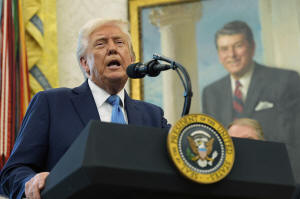Law firms fighting Trump to ask judges to permanently block executive
orders
[April 23, 2025]
By ERIC TUCKER
WASHINGTON (AP) — Two major law firms are expected to ask separate
judges on Wednesday to permanently block President Donald Trump’s
executive orders that were designed to punish them and hurt their
business operations.
The firms — Perkins Coie and WilmerHale — have said the orders imposed
in March are unconstitutional assaults on the legal profession that
threaten their relationships with clients and retaliate against them
based either on their past legal representations or their association
with particular attorneys who Trump perceives as his adversaries.
Courts last month temporarily halted enforcement of key provisions of
both orders, but the firms are in court Wednesday asking for the edicts
to be struck down in their entirety and for judges to issue rulings in
their favor. Another firm, Jenner & Block, is expected to make similar
arguments next week.
“Although Perkins Coie did not bring this suit lightly, it was compelled
to do so to preserve its ability to continue representing the best
interests of its clients,” lawyers for Perkins Coie wrote in a filing
ahead of the hearing. “The Constitution does not permit our elected
leaders, from any party, to punish lawyers by fiat for representing
clients who oppose their political agendas. It would set a grave
precedent for our Republic if the Order were allowed to stand.”

The executive orders taking aim at some of the country's most elite and
prominent law firms are part of a wide-ranging retribution campaign by
Trump designed to reshape civil society and extract concessions from
perceived adversaries. The actions have forced targeted entities,
whether law firms or universities, to decide whether to push back and
risk further incurring the administration's ire or to agree to
concessions in hopes of averting sanctions. Some firms have challenged
the orders in court, but others have proactively reached settlements.
The orders have generally imposed the same consequences, including
directing the suspension of attorney security clearances, restricting
lawyers' access to federal buildings and terminating federal contracts.
[to top of second column]
|

President Donald Trump speaks with reporters as he participates in a
ceremonial swearing in of Paul Atkins as chairman of the Securities
and Exchange Commission, in the Oval Office of the White House,
Tuesday, April 22, 2025, in Washington. (AP Photo/Alex Brandon)

The first law firm action took place in February when Trump signed a
memo suspending the security clearances of attorneys at Covington &
Burling who have provided legal services to special counsel Jack
Smith, who investigated the president between his first and second
terms and secured two indictments that have since been abandoned.
The executive order targeting Perkins Coie singled out the firm's
representation of Democratic presidential nominee Hillary Clinton
during the 2016 presidential race, and the one against WilmerHale
cited the fact that special counsel Robert Mueller — who
investigated Trump during his first term over potential ties between
Russia and his 2016 campaign — was for years a partner at the firm.
Last month, the firm Paul Weiss cut a deal with the Trump
administration that resulted in an executive order against it being
rescinded.
Since then, more than a half-dozen other firms have reached
agreements with the White House that require them, among other
things, to dedicate free legal services to causes the Trump
administration says it champions.
They include Skadden, Arps, Slate, Meagher & Flom; Milbank; Willkie,
Farr & Gallagher; Kirkland & Ellis; Latham & Watkins LLP; Allen
Overy Shearman Sterling US LLP; Simpson Thacher & Bartlett LLP; and
Cadwalader, Taft & Wickersham.
All contents © copyright 2025 Associated Press. All rights reserved
 |